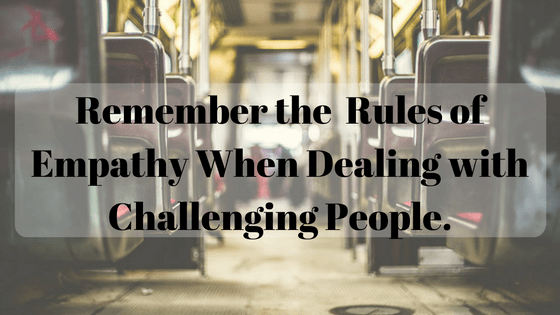The 3 Rules Of Empathy
We have all had to deal with difficult or challenging people at some point in our lives. At work, at home, or during social events we encounter someone that rubs us the wrong way. There is a great deal of content available about how to deal with difficult people but there is a clear shortfall when it comes to offering an explanation as to why we find certain people challenging. I want to share with you the two reasons we find some people challenging as well as the three rules I follow when dealing with really difficult people.
When we meet someone new we make an immediate assessment. Are they like us or not? If they are not like us we start to feel threatened. Perhaps that person has a different set of values or are forcing us to question how we do things. Either way, we know that spending time with that person will require a little extra energy and we are not willing to make that investment. If they are too much like us we start to wonder if they will steal some of our spotlight.
The second, and most common, reason as to why we find certain people challenging is because they are acting as a mirror for us. They possess a quality or trait that we fear we hold within ourselves. We are self-conscious about it and therefore don’t appreciate seeing it in someone else.
What we don’t like in others is really a reflection of something we don’t like or we fear is missing in ourselves.
Here’s the thing. Until you deal with that thing that you don’t like about yourself you will continue to encounter people that possess the very quality or attribute you fear the most. It’s really that simple.
In the meantime please remember this; the only tool you really need to deal with difficult or challenging people is empathy. I want to share with you my three rules of empathy (use wisely).
3 Rules of Empathy (Practicing empathy requires making these assumptions about everyone that we meet, everyday.):
- Behind every action is a positive intention – You may not see it but, the other person always has a good reason for their behaviour and in their mind their action was necessary. Your job is to ask yourself “What might be the positive intention behind this person’s behaviour”?
- People are doing the best they can, with what they have, in this moment – Most people are making the best choice they can with the information they have. That decision or behaviour may not make sense to us but it does to them.
- The behaviour of others rarely has anything to do with us– Most people are so focused on themselves that even when their reaction seems directed at us, it likely reflects how they feel inside.
The next time you encounter someone that you find challenging open yourself up to the possibility that this person has something to teach you about yourself. Become curious about what you can learn from that person. Practice cultivating empathy to slow down your initial response of judgment or annoyance.

